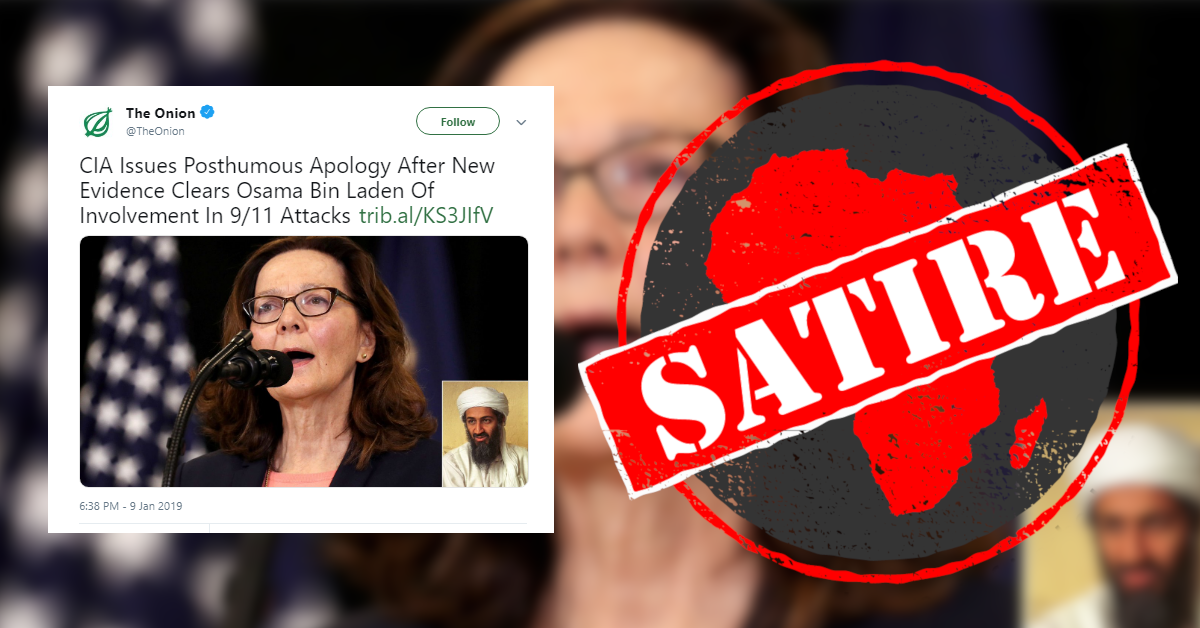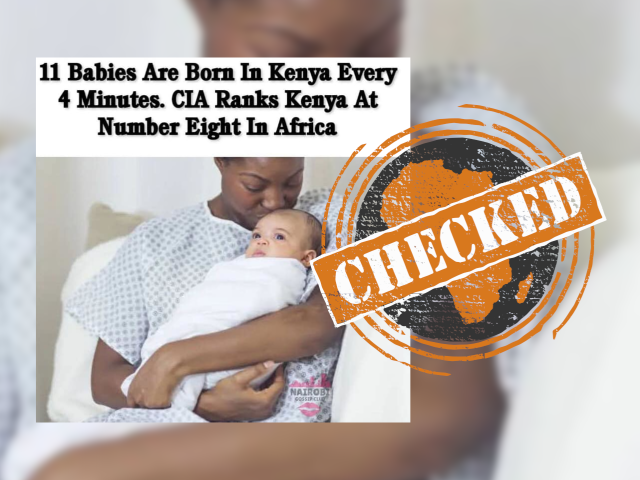Has the CIA, the US Central Intelligence Agency, apologised for blaming Osama bin Laden for the 9/11 attacks on the World Trade Centre in New York on 11 September 2001?
“CIA issues posthumous apology after new evidence clears Osama bin Laden of involvement in 9/11 attacks” reads the headline of an article shared nearly 45,000 times on Facebook – including pages in Uganda and Nigeria.
But it’s not true. It’s a piece of fiction published by the Onion, a well-known satire site based in the US, on 9 January 2019.

The article includes photos of both CIA director Gina Haspel and Bin Laden, the Saudi Arabian founder of Islamist group al Qaeda who was known as the masterminded of the 9/11 attacks.
Bin Laden was killed in Abbottabad, Pakistan on 2 May 2011 by members of the US Navy’s Seal Team Six.
“Our organisation acted in haste and without full knowledge, and in doing so, took the life of a loving husband, father, businessman, and highly effective community organiser,” the satirical article has Haspel saying.
“We understand there is nothing we can do or say will bring Osama back, but we hope the Bin Laden family will accept restitution of $18 million in recognition of their pain and suffering.”
The apology can’t be found on the CIA website, and hasn’t been reported by any credible news site – both clues that it’s fiction.
But it was still published as real news by Yahoo, in their entertainment section, 14 days after it appeared on the Onion. It was later taken down.
Yahoo didn’t point out that it was satire – although they acknowledged the Onion in the byline – so readers might have thought it was real.
US fact-checking site Snopes tried to contact both the Onion and Yahoo, “but neither responded prior to publication”.
The satire was also republished on Jon Taffer and Trendolizer.
When satire is shared as news, it becomes misinformation. This instance is a reminder that we must all take care before we share when we come across startling and unusual stories online. – Africa Check
“CIA issues posthumous apology after new evidence clears Osama bin Laden of involvement in 9/11 attacks” reads the headline of an article shared nearly 45,000 times on Facebook – including pages in Uganda and Nigeria.
But it’s not true. It’s a piece of fiction published by the Onion, a well-known satire site based in the US, on 9 January 2019.

Apology can’t be found
The article includes photos of both CIA director Gina Haspel and Bin Laden, the Saudi Arabian founder of Islamist group al Qaeda who was known as the masterminded of the 9/11 attacks.
Bin Laden was killed in Abbottabad, Pakistan on 2 May 2011 by members of the US Navy’s Seal Team Six.
“Our organisation acted in haste and without full knowledge, and in doing so, took the life of a loving husband, father, businessman, and highly effective community organiser,” the satirical article has Haspel saying.
“We understand there is nothing we can do or say will bring Osama back, but we hope the Bin Laden family will accept restitution of $18 million in recognition of their pain and suffering.”
The apology can’t be found on the CIA website, and hasn’t been reported by any credible news site – both clues that it’s fiction.
Satire shared as news becomes misinformation
But it was still published as real news by Yahoo, in their entertainment section, 14 days after it appeared on the Onion. It was later taken down.
Yahoo didn’t point out that it was satire – although they acknowledged the Onion in the byline – so readers might have thought it was real.
US fact-checking site Snopes tried to contact both the Onion and Yahoo, “but neither responded prior to publication”.
The satire was also republished on Jon Taffer and Trendolizer.
When satire is shared as news, it becomes misinformation. This instance is a reminder that we must all take care before we share when we come across startling and unusual stories online. – Africa Check
Republish our content for free
For publishers: what to do if your post is rated false
A fact-checker has rated your Facebook or Instagram post as “false”, “altered”, “partly false” or “missing context”. This could have serious consequences. What do you do?
Click on our guide for the steps you should follow.
Publishers guideAfrica Check teams up with Facebook
Africa Check is a partner in Meta's third-party fact-checking programme to help stop the spread of false information on social media.
The content we rate as “false” will be downgraded on Facebook and Instagram. This means fewer people will see it.
You can also help identify false information on Facebook. This guide explains how.



Add new comment